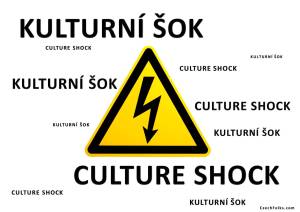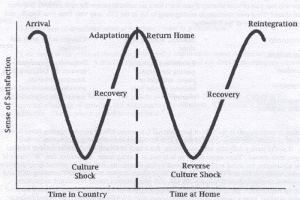“For the born traveller, traveling is a besetting vice. Like other vices, it is imperious, demanding its victim’s time, money, energy, and sacrifice of comfort.”
– Aldous Huxley

One of the more overlooked aspects of travel is the inevitable “culture shock” that happens to all travelers. You might think that you haven’t been affected, but do you remember that feeling of awe, that “honeymoon phase” when you step off the plane or bus? That’s culture shock.

In reality, every aspect of being abroad, from a psychological standpoint, is affected by culture shock. The curve above diagrams the culture shock curve based on how long you are in one place. There is some debate on how many stages actually exist in culture shock, although the majority of sources still outline the same features present at each stage.
The following phases are considered the “official” stages of culture shock based on the UKCISA website:
- The “honeymoon” stage: When you first arrive in a new culture, differences are intriguing and you may feel excited, stimulated and curious. At this stage you are still protected by the close memory of your home culture.
- The “distress” stage: A little later, differences create an impact and you may feel confused, isolated or inadequate as cultural differences intrude and familiar supports (eg family or friends) are not immediately available.
- “Re-integration” stage: Next you may reject the differences you encounter. You may feel angry or frustrated, or hostile to the new culture. At this stage you may be conscious mainly of how much you dislike it compared to home. Don’t worry, as this is quite a healthy reaction. You are reconnecting with what you value about yourself and your own culture.
- “Autonomy” stage: Differences and similarities are accepted. You may feel relaxed, confident, more like an old hand as you become more familiar with situations and feel well able to cope with new situations based on your growing experience.
- “Independence” stage: Differences and similarities are valued and important. You may feel full of potential and able to trust yourself in all kinds of situations. Most situations become enjoyable and you are able to make choices according to your preferences and values.
**It is important to note that at the end of these stages, there is always a separate categorization for “reverse culture shock” which can be just as surprising.
The first stage of culture shock is the easiest to recognize, since it happens to everybody before and during the first few weeks of travel. You are excited, happy, and ready to explore everything that your new [temporary?] home has to offer. This stage can last for a while, or only just a week, depending on how well you adjust culturally to your surroundings.
If you have been in a city or country longer than a month, you have begun to feel the effects of stage two. For me, this wasn’t as strong as most people, but I still felt the remnants of not being able to go to the local cafe and see my friends. The strangest part was walking around and hearing nothing but spanish everywhere, something that made sense in my head, but I couldn’t quite grasp.
Stage three hit about a month ago. You will find yourself angry or frustrated with local customs and cultural norms. The things done daily by locals will start to really just tick you off. This stage for me, hit while we were traveling in the south of Chile. The most irritating portion of Chilean everyday activities, for me, was 1) huge groups of middle and high school aged children walking in a straight line across the entire sidewalk and not moving to let you pass, and 2) the kissing noises and general verbal “appreciations” of women by any and all men here. The second, especially, is a Latin American thing, and as I am told, it is simply considered polite to show your appreciation to the entire female gender no matter where, when, or who.
Most traditionally, stages four and five are felt together. You find yourself accepting the culture again, but this time with the knowledge that you can fully become a part of the culture. You have a new understanding of how the society functions.
At the end of all this, you will go through all these stages again while re-integrating into your home country, however don’t let that deter you!
I want this understanding of culture shock to be understood by travelers, not feared. You will appreciate your adventures so much more if you understand first why the culture makes you feel a certain way. So go immerse yourself and see how culture shock manifests itself to you!
Happy Travels!